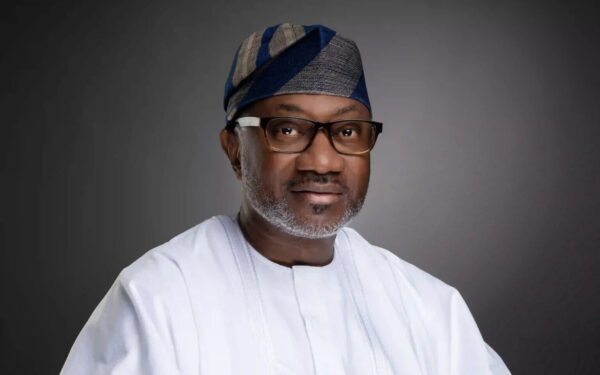•Bagudu moves to boost rural economy, CBN supports expansion with new MPR
James Emejo in Abuja and Nume Ekeghe in Lagos
The World Bank has commended Nigeria’s Renewed Hope Ward Development Programme, which aims to translate Nigeria’s macroeconomic reforms into real, grassroots benefits across all 8,809 wards nationwide.
The federal government initiative also aims at stimulating economic activity, boosting food security, generating jobs, and reducing poverty by directly supporting at least 1,000 economically active individuals per ward.
The new Country Director, World Bank, Mr. Matthew Verghis, gave the commendation during a meeting with Nigeria’s Minister of Budget and Economic Planning, Senator Abubakar Bagudu, in Abuja, yesterday.
Bagudu in his remarks, intimated his guests that the groundbreaking ward initiative was designed to boost rural economy and that the raft of policy initiatives being introduced, coupled with reform were to ensure economic transformation .
This was as the Central Bank of Nigeria (CBN) reiterated confidence in the country’s macroeconomic outlook, insisting that its recent decision to reduce the Monetary Policy Rate (MPR) by 50 basis points would stimulate and expand growth without undermining the stability of the naira.
In an interview on TVC yesterday, Director of Monetary Policy at the apex bank, Dr. Victor Oboh, explained that the rate cut was carefully designed to ease borrowing costs for small businesses and households, while Nigeria’s strong external buffers and stable exchange rate would prevent capital flight.
Speaking further, Verghis, the new World Bank Country Director, congratulated Nigeria on the bold reforms undertaken so far, describing them as a “development breakpoint” that could reset the country’s trajectory.
The country director said, “Nigeria’s recent decisions represent a critical moment. Such choices are not easy, but they create opportunities for a new path.
“The World Bank stands ready to continue supporting Nigeria in maintaining these reforms and increasing their impact.”
On the Renewed Hope Ward Development Programme, he emphasised the importance of utilising proven approaches.
He said, “The challenge is not just in designing new programmes but in building on what already works. Existing projects such as NG-CARES and the Nigeria for Women Project have established effective structures.
“We are eager to expand on these models, bring in global experience from India, China, and Kenya, and provide both technical and financial support to strengthen implementation.”
Verghis further emphasised the importance of aligning grassroots development with long-term national priorities.
He said, “We understand the objectives are jobs, prosperity, and inclusion. For the poorest, immediate support is needed; for the youth, opportunities for productivity; for the nation, a pathway to sustained growth. These are challenges we want to work with you to address.”
Verghis’s first official engagement with the ministry since taking office reaffirmed the strong partnership between Nigeria and the World Bank in promoting inclusive growth, poverty alleviation, and sustainable development.
In his remarks, Bagudu, urged the World Bank to support the Renewed Hope Ward Development Programme, aimed at boosting economic activities at the grassroot.
The minister noted that the new initiative would help achieve President Bola Tinubu’s target of a $1 trillion economy by 2030.
The minister said, “The objectives, among others, are to promote sustainable and inclusive growth at the ward level, which will contribute to national development.
“This will support the $1 trillion GDP target by 2030 and help lift all Nigerians out of poverty.”
He stated that the programme, recently approved by the National Economic Council (NEC) and coordinated by the ministry, is a transformative initiative aimed at driving bottom-up growth.
The minister added, “This programme will map economic opportunities in all 8,809 wards across the country and support economically active citizens to generate more value.
“It is about creating sustainable and inclusive growth from the grassroots. The objective is clear: to support our ambition of achieving a $1 trillion GDP by 2030 and lifting millions of Nigerians out of poverty.”
He noted that the country was learning from other countries while developing a uniquely Nigerian approach.
Bagudu said, “We have examined China’s experience of lifting 852 million people out of poverty, India’s rural transformation, and Kenya’s bottom-up strategy.
“Nigeria can incorporate these lessons, but with a model that reflects our constitutional federalism and ensures all three tiers of government take responsibility.”
He also highlighted Nigeria Agenda 2050, the country’s long-term strategic plan, as a key driver of national development.
According to him, “Agenda 2050 is ambitious but achievable. It reflects our national consensus—enshrined in Chapter Two of our Constitution—that all tiers of government must work together to deliver economic, social, and environmental objectives.
“Our duty is to translate this vision into actionable five-year plans and annual budgets that are people-centred and results-driven.”
Bagudu expressed sincere gratitude to the Bretton Woods institution for its ongoing support, particularly during the last 28 months of economic reforms, emphasising that the bank had remained committed to Nigeria through a difficult yet transformative period.
He said, “The World Bank team has collaborated with us not just as partners but as members of the same team. We could not have achieved the results we have today without your support.
“Together, we have taken bold steps that are beginning to restore macroeconomic stability and inspire confidence at home and abroad.”
The minister stressed the importance of maintaining the momentum of reform.
He said, “Our reforms have demonstrated the value of staying the course in the right direction. With effective policies and difficult but necessary choices, we are beginning to see results. The task now is to build on these achievements and ensure that no willing Nigerian is left behind.”
Bagudu also reaffirmed the ministry’s role as a coordinating body rather than a competing one.
He said, “This Ministry is not in competition with any other. Our role is to coordinate, convene, and ensure that all levels of government work towards the same goal: inclusive prosperity for every Nigerian.”
Meanwhile, the CBN has explained that its recent decision to reduce the MPR by 50 basis points would stimulate growth without undermining the stability of the naira.
He also pointed to fresh policy measures, including a new 75 per cent Cash Reserve Ratio (CRR) on non-TSA (Treasury Single Account) public sector deposits, designed to mop up excess liquidity.
“We expect the rate cut of 50 basis points to have a significant impact on the real economy. This cut should support economic recovery, particularly by lowering borrowing costs, with credit channeled towards growth-enhancing sectors. We expect sm all businesses and similar enterprises to benefit,” he added.
He dismissed concerns that easing monetary conditions could weaken the naira.
According to him, with foreign reserves above $43 billion, stable exchange rates, narrowing spreads between official and parallel markets, and strong capital inflows from remittances and portfolio investors, the local currency remains resilient. “We do not expect any adverse impact of the rate cut on the strength of the naira. Our fundamentals are robust,” he stressed.
On how the CBN intends to keep inflation in check despite the rate cut, Oboh highlighted fiscal and structural measures such as increased agricultural output, improved security in farming communities, and competitive dynamics in the downstream petroleum sector, which have begun to ease transport costs.
“The harvest season will also soften inflation. The prevailing rate continues to attract foreign inflows from portfolio investors and remittances, with good liquidity in the FX market. We don’t expect the rate cut to affect the strength of the naira,” he added.
Still on inflation taming and the decision to subject non-TSA public deposits to a 75 per cent CRR, he said: “A key measure was subjecting all non-TSA public deposits to a 75 per cent CRR, to control excess liquidity that may pose an inflation threat, which could fuel inflation. These decisions are to encourage economic recovery, and on the other hand, we are not oblivious of the risks and threat to inflation.”
Oboh acknowledged that households struggling with high living costs might not feel the impact immediately, but he emphasised that the monetary transmission process is already underway.
“When the MPR is lowered, borrowing costs for banks are reduced. If commercial banks can access funds more cheaply, they are expected to lower lending rates to households and businesses. Lower borrowing costs will cut production costs, which will then reduce product prices. This will increase purchasing power and help households cope with the cost of living,” he noted.
The CBN’s latest action, Oboh explained, also aligns with the global wave of monetary easing, citing recent decisions by the US Federal Reserve and the Bank of Ghana, which had also cut rates.
“The MPC reviewed global trends. We are aware of the global uncertainties around tariffs, trade wars, and the rest of them, and that is what the governor meant when he said he is very cautious about what happens at the global level. “MPC also took cognisance of recent monetary policy decisions taken by many central banks and also our peers at the global level. Many major central banks are cutting rates to stimulate growth and jobs,” he added.
Looking ahead, Oboh maintained that the outlook for inflation and broader economic conditions would determine the MPC’s next steps.
“The outlook showed that going into the rest of the year, we would expect inflation to trend downward. The pace will be encouraging, and if that happens, the MPC will take the best decision in the interest of the country.
“What I would like to say is to assure investors and all Nigerians that the outlook is very optimistic, and the macro indicators are also moving in the right direction, and the MPC will be guided by data, even as we approach the next MPC in November. The entire outlook for the macro economy looks optimistic.”
The post World Bank Backs FG’s Groundbreaking Ward Initiative appeared first on THISDAYLIVE.


